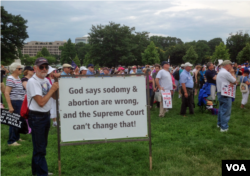In a widely anticipated move, the U.S. Supreme Court cast aside a half-century-old ruling that established a constitutional right to abortion, leaving it to states to decide whether or not to permit the procedure.
Friday’s ruling by the high court’s conservative majority came less than two months after an early draft of the decision was leaked to a news site, setting off nationwide protests by abortion rights activists.
While the high court’s overturning of its 1973 ruling in the case known as Roe v. Wade and a separate case called Planned Parenthood v. Casey does not impose a ban on abortion, its legal impact will ripple through the country almost immediately.
The Guttmacher Institute, a pro-choice research group, estimates that 26 states, mostly in the south and midwest, will ban abortion in the wake of Roe v. Wake’s repeal. That could force millions of women seeking an abortion to travel to states where abortion rights are protected.
The Supreme Court’s ruling came in a closely-watched case involving a Mississippi law that bans nearly all abortions after the 15th week of pregnancy, several weeks before the cutoff stage established under Roe v. Wade.
Jackson Women’s Health Organization, the only abortion clinic in Mississippi, challenged the 2018 law in federal court, arguing that it would violate nearly 50 years of Supreme Court precedent.
After two lower courts sided with the clinic, the state of Mississippi, backed by 25 other Republican-controlled states, went to the Supreme Court, asking the justices to overturn both Roe and Casey. Their petition claimed that “nothing” in the constitution “supports a right to abortion.”
Six of the high court justices, all appointed by Republican presidents, agreed.
“The Constitution makes no reference to abortion, and no such right is implicitly protected by any constitutional provision, including…the Due Process of the 14th Amendment,” conservative Justice Samuel Alito wrote in the majority opinion
The 14th Amendment says that no state can “deprive any person of life, liberty, or property without due process of law.”
That provision has been invoked by the Supreme Court in recent decades to affirm rights not explicitly mentioned in the Constitution such as the right to same-sex marriage. But Alito argued that “any such right must be ‘deeply rooted in this nation’s history and tradition.'”
“The right to abortion does not fall within this category,” he wrote in the leaked draft.
Instead of the Supreme Court, states should decide whether to allow or ban abortion, the opinion said.
The court’s three liberal justices, joined by conservative Chief Justice John Roberts, dissented.
Few issues in America are as divisive as abortion. For the past 50 years, American conservatives, driven by a desire to protect unborn life, have campaigned against the Roe v. Wade abortion ruling. But they lacked the votes on the high court to overturn it.
That changed after Donald Trump won the 2016 presidential election and put three anti-abortion justices on the high court. That gave conservatives a 6-3 supermajority on the powerful court, raising the likelihood that the conservative justices will overturn the abortion ruling.
Generally, the Supreme Court follows principles established in its prior rulings, a doctrine known as stare decisis. The dissenting justices wrote that the ruling violated this long-standing legal precept.
But Alito said that there are circumstances where a precedent has and can be overturned. In a landmark ruling in 1954, for example, the Supreme Court invalidated an 1896 decision that had legalized racial segregation in the United States, Alito noted.
Alito wrote that the court’s ruling was limited to abortion and would not affect other rights. But liberal critics of the decision worry the decision will open the door to the overturn of other rights recognized by the Supreme Court.
“If you strike down a law based on a fundamental disagreement with the legal reasoning that underpins it, the same exact arguments will allow the other decision to be overturned,” said Caroline Fredrickson, a law professor at Georgetown University and a senior fellow at the left-leaning Brennan Center for Justice.
The ruling came less than two months after an initial draft of the opinion was leaked to a political news site, setting off both praise and criticism across the political spectrum.
While anti-abortion activists and politicians hailed the draft opinion as a “victory for human life,” their liberal counterparts condemned it as an assault on reproductive and other privacy rights.
In anticipation of the ruling, states across the country, depending on their legislatures’ ideological leanings, have been changing their abortion rules.
In conservative states, in addition to passing so-called “trigger laws” designed to take effect after Roe is overturned, lawmakers have moved to tighten restrictions on abortion, with Oklahoma enacting a law in March that bans abortion at any point during pregnancy.
For their part, the more politically liberal states have responded by passing legislation to expand access to abortion, with some states considering laws that would allow nurses to carry out the procedure.
The court ruling comes despite growing public acceptance of abortion. A Gallup Poll conducted after the court’s draft decision was leaked in May indicated that 55% of Americans identified as “pro-choice,” the highest level of such sentiment since the mid-1990s.
Still, abortion remains a politically divisive issue that is likely to live on well past Roe’s demise. Abortion-rights groups are gearing up to challenge new state bans and restrictions in state courts, setting off protracted legal battles.
“Part of the issue is that you have to find some protections within the state constitutions in order to bring these cases,” said Elizabeth Nash, a state policy analyst for the Guttmacher Institute.
Complicating efforts to challenge state abortion bans, four states — Alabama, Louisiana, Tennessee and West Virginia — have passed constitutional amendments that say the state constitution does not recognize the right to abortion, Nash noted. In two others — Kansas and Kentucky — voters are expected to vote on the issue later this year.



